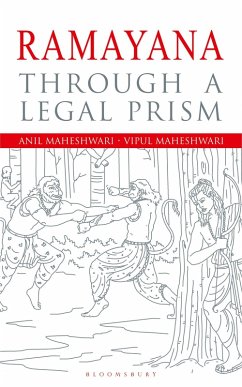Rama, Maryada Purushottam, the king of Ayodhya, banished his beloved queen, in whose chastity he had complete faith, simply because his subjects disapproved of his accepting a wife who had spent a year in the house of her abductor. The king submitted to the will of the people though it broke his heart. Was his stand justified?
Could Manthara be held solely responsible for the banishment of Rama and the subsequent death of Dasharatha?
Was Ahalya an adulteress or a victim of sexual assault?
Did the actions of the serial molester Ravana stand legal scrutiny?
Was Lakshmana, a prince of Ayodhya, legally justified in mutilating Surpanakha? Was his elder brother Rama an accomplice in that action?
It was said in ancient India, a king who, after having sworn to safeguard his subjects, failed to protect should be executed like a mad dog. Such a provision indicated that sovereignty was based on an implied social contract, and if the king violated the traditional pact, he forfeited his kingship. So, a king had to be just as justice trickled down from the crown. What happens though if the events of yore are retold and characters made to stand trial in today's time?
Here is an attempt, unexplored so far, to retell the significant happenings narrated in the Ramayana through the legal prism of the Indian Penal Code. Each chapter comprises a prosecution version, citations of relevant provisions from the IPC, deposition of witnesses and the defence argument. Ramayana Revisited succeeds in bringing in all alternative perspectives, leaving the final judgement to the discretion of the reader.
Could Manthara be held solely responsible for the banishment of Rama and the subsequent death of Dasharatha?
Was Ahalya an adulteress or a victim of sexual assault?
Did the actions of the serial molester Ravana stand legal scrutiny?
Was Lakshmana, a prince of Ayodhya, legally justified in mutilating Surpanakha? Was his elder brother Rama an accomplice in that action?
It was said in ancient India, a king who, after having sworn to safeguard his subjects, failed to protect should be executed like a mad dog. Such a provision indicated that sovereignty was based on an implied social contract, and if the king violated the traditional pact, he forfeited his kingship. So, a king had to be just as justice trickled down from the crown. What happens though if the events of yore are retold and characters made to stand trial in today's time?
Here is an attempt, unexplored so far, to retell the significant happenings narrated in the Ramayana through the legal prism of the Indian Penal Code. Each chapter comprises a prosecution version, citations of relevant provisions from the IPC, deposition of witnesses and the defence argument. Ramayana Revisited succeeds in bringing in all alternative perspectives, leaving the final judgement to the discretion of the reader.









